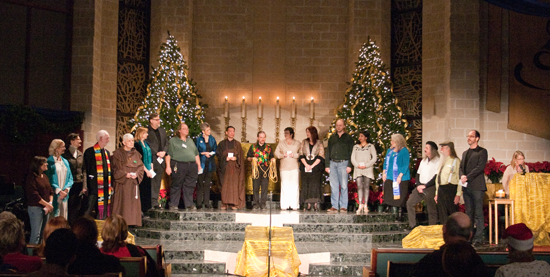Amy at Texas Faith: Is President Obama part of reinventing American civil religion?
TEXAS FAITH: Is President Obama part of reinventing American civil religion – God and the public square?
Question by Wayne Slater
Author and speaker Diana Butler Bass suggests that we are in the process of reinventing American civil religion, the way we think about God and national purpose. And she says President Obama is part of that process. Obama, like his predecessors in the White House, has generally drawn the older form of civil religion complete with biblical language, social justice evangelicalism, and the themes of orthodox theology. But, she suggests, something has changed in the last couple of years. His speeches have included a view of God with an appeal to a wider faith audience, she says.
“Gone is the God of biblical revelation, the generalized God-as-Father-in-Heaven, and the distant God of Providence. Rather, Obama’s public God is a personal spirit, the relational presence of inclusion, community, empathy, irony, justice, and service. The God of this new and emerging American civil religion is a God who is with humankind, a far more embracing rather than judgmental figure, who loves and acts in the world through the works of human beings. Most theists can recognize this God (or gods) in their own religious traditions; most non-theists can interpret this sort of God as a spirit of beauty or justice in humankind.
This comes as America is becoming more pluralistic, as fewer people are claiming membership in orthodox religious groups. American civil religion has long emphasized a language and set of public practices based on the “biblical archetypes” of “Exodus, Chosen People, Promised Land, New Jerusalem, and Sacrificial Death and Rebirth” But the newer civil spirituality, which Bass says Obama expressed in his 2013 inaugural address, does something else: It reaches away from traditional civil religion and toward civil spirituality—a less dogmatic, more open-ended form of inspirational public speech.
Is she right? Is what is being called a new civil spirituality just the old civil religion in new clothes? Or is it a somewhat different, more inclusive, a new way of talking about God in the public square? And if so, isn’t that a good thing?
AMY MARTIN, Director Emeritus of Earth Rhythms and Writer/editor Moonlady News Newsletter
If starting today no more children could be produced, precipitating mankind’s end, would your life have meaning? In a poll for a public radio podcast, the answer was no. Pollsters said the respondents seemed to be as surprised at the answer as they were. What are we doing all this for? This heroic trajectory of humanity from dwelling in caves to creating skyscrapers, surely it means something. Our journey began far before religions, nations or even races. Isn’t our species the first allegiance?
We are lost in the banal and beautiful minutiae of our daily lives, subconsciously haunted by the specter of inevitable death, and swimming in a media fray of politics and pop culture. It takes a direct question like that to get through. We need our tribes, our family and friends and the other circles we create. But we must loose our tribalism. While holding fast to the beliefs and culture that make us unique, the highest common denominators should be celebrated. It is upon such civic ideals that society must rest.
Everything old is new again, of course, and the arising civic philosophy is much like the state religion of Shinto in Japan. Its observances — followed by Buddhists, Christians, Taoists and secular alike — form the nation’s official holiday calendar. The Earth’s bounty is celebrated with equinoxes, flower festivals and Moon watching nights. Observances even address the psychological needs of the public such as ancestor honoring, adolescent rites of passage, and more.
For 20 years I created Winter SolstiCelebration, the largest interfaith celebration outside of New York City. Each year a spiritual theme was explored: oneness, humility, worthiness, to name a few. Held in a Christian church, it was attended by people of all faiths, but the spiritually unaffiliated embraced it the most. Within the next decade, SolstiCelebration type events will be far more common. Why? Because we need connection, to each other, our communities, and the Earth.
